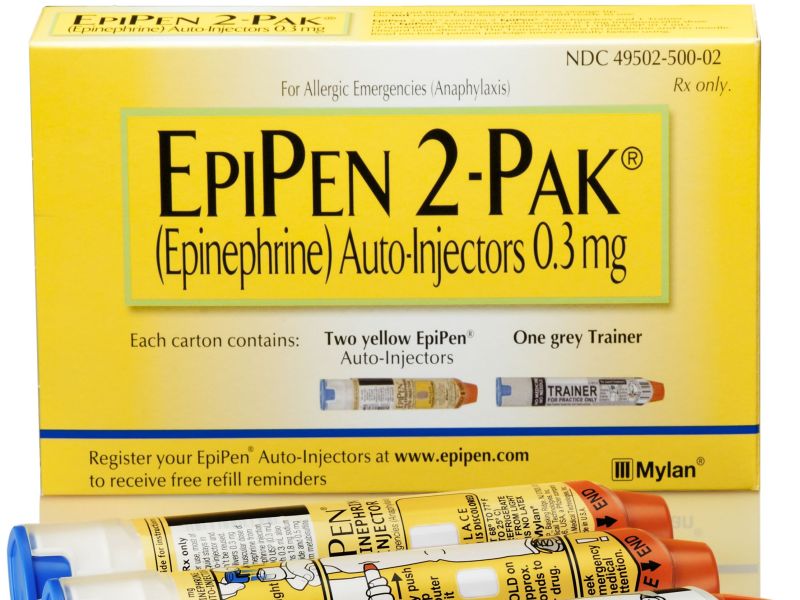

Expired EpiPens May Still Help Save a Life: Study
But allergy experts advise not counting on older devices if you can replace themTuesday, May 9, 2017

TUESDAY, May 9, 2017 (HealthDay News) -- EpiPens -- devices used to rescue people during a severe allergic reaction -- can remain effective years after their expiration date, a new study reports.
An evaluation of almost 40 expired, unused EpiPens brought in by patients revealed that all of the devices contained more than 80 percent of their initial dose of epinephrine. This was true even as long as four years past the expiration date on the device, said study lead researcher F. Lee Cantrell, director of the California Poison Control System - San Diego Division.
People unable to replace an old EpiPen due to pharmacy shortages should hold onto it past expiration, because the device could still contain a lifesaving dose, Cantrell concluded.
"There's still a dose that would be therapeutic in there," he said. "If this is all you have, this is better than nothing."
Cantrell still recommends people replace expired EpiPens if fresh ones are available, as a matter of safety.
"If it's me, if I'm highly allergic to a bee sting, I want something that I know is going to save my life," Cantrell said. "At the same time, if an expired EpiPen is all that I have, I would use it."
However, he believes the U.S. Food and Drug Administration and the maker of the EpiPen, Mylan, should reassess the expiration date set for EpiPens to see if it can be extended.
Expiration dates are based on studies conducted during a drug's evaluation process that test its stability in both ideal and poor storage conditions, the FDA said in a statement. After approval, companies are required to continue these studies, and can request an extension of the expiration date if the data supports it.
In a statement, Mylan said its products carry expiration dates that reflect the final day "that a product has been determined to be safe and effective when stored under the conditions stated in the package insert."
"Given the life-threatening nature of anaphylaxis, patients are encouraged to refill their EpiPen Auto-Injector upon expiration, approximately every 12 to 18 months," the company's statement reads. "Mylan also continues to invest in product improvements, such as a formulation with a longer shelf life."
Cantrell and his colleagues conducted their study after a steep hike in the price of EpiPens caused a consumer rush at pharmacies.
Mylan obtained the rights to sell the EpiPen in 2007, and has since increased the list price of the auto-injector from $94 to $609, according to news reports. People with extreme allergies keep EpiPens on hand to prevent a potentially fatal allergic reaction.
In response to patient outcries over the price increase, Mylan released a $300 generic version of the EpiPen.
Pharmacists reported to Cantrell that people started buying out all their EpiPen supplies as prices continued to rise.
"People got really scared their insurance carriers were no longer going to pay for the drug because it was so expensive, so everyone went to pharmacies and cleaned them out," Cantrell said. "They wanted to stockpile and get them while it was still covered."
Patients began calling poison control centers to see if an EpiPen would still be good for use past expiration, prompting Cantrell and his colleagues to seek an answer.
During two weeks, patients at a community clinic in San Diego were asked to bring in unused, expired EpiPens so they could be examined, the researchers said. The team ended up with 31 EpiPens and 9 EpiPen Jrs.
None of the pens was discolored -- a sign that it's gone bad and should not be used, Cantrell said.
Analysis revealed that all of the pens still retained most of their potency. The lowest level of epinephrine, 81 percent, was found in an EpiPen Jr. 30 months past its expiration date.
About 65 percent of the EpiPens and 56 percent of the EpiPen Jrs. contained at least 90 percent of their initial epinephrine dose, the researchers concluded.
Despite these findings, allergist Dr. Andrew Murphy said patients should not hold off replacing their injector to save money.
"The drug is labeled to be good to a certain date," said Murphy, who practices in Downingtown, Pa. "That's what I know as a prescribing physician, that the FDA and the pharmaceutical company have guaranteed that.
"Having said that, if someone is at home and they're having a reaction and the only thing they have available is an expired epinephrine injector, as long as it's not yellow or cloudy or has something floating in there, go ahead and use it," Murphy continued.
A larger study is needed to confirm what this new paper reports, Murphy said, but the findings do indicate that the FDA should re-evaluate how long the pens are viable.
People need to keep in mind that the epinephrine in the injectors can degrade more quickly if they're poorly stored, Murphy said. For example, a pen kept in a car can be subjected to high heat in the summer and freezing cold in the winter, which would affect the stability of the drug.
"The reality is, most people don't store their pens under ideal circumstances," Murphy said.
The study appeared in the May 8 Annals of Internal Medicine.
SOURCES: F. Lee Cantrell, Pharm.D., director, California Poison Control System - San Diego division; Andrew Murphy, M.D., allergist, Downingtown, Pa.; May 8, 2017, Annals of Internal Medicine
HealthDay
Copyright (c) 2017 HealthDay. All rights reserved.
News stories are written and provided by HealthDay and do not reflect federal policy, the views of MedlinePlus, the National Library of Medicine, the National Institutes of Health, or the U.S. Department of Health and Human Services.
- More Health News on
- Anaphylaxis
- Medicines




























.png)











No hay comentarios:
Publicar un comentario